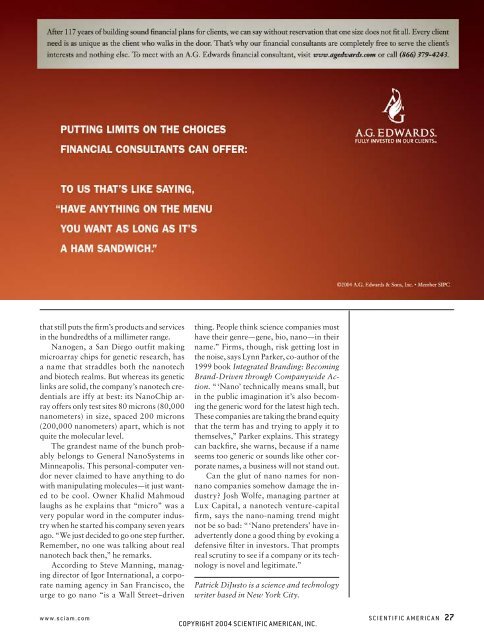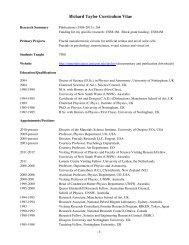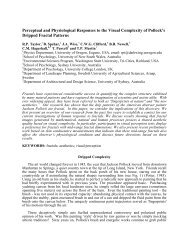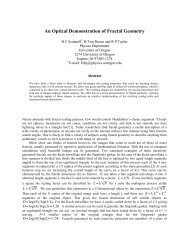December 2004 - Materials Science Institute - University of Oregon
December 2004 - Materials Science Institute - University of Oregon
December 2004 - Materials Science Institute - University of Oregon
Create successful ePaper yourself
Turn your PDF publications into a flip-book with our unique Google optimized e-Paper software.
that still puts the fi rm’s products and services<br />
in the hundredths <strong>of</strong> a millimeter range.<br />
Nanogen, a San Diego outfit making<br />
microarray chips for genetic research, has<br />
a name that straddles both the nanotech<br />
and biotech realms. But whereas its genetic<br />
links are solid, the company’s nanotech credentials<br />
are iffy at best: its NanoChip array<br />
<strong>of</strong>fers only test sites 80 microns (80,000<br />
nanometers) in size, spaced 200 microns<br />
(200,000 nanometers) apart, which is not<br />
quite the molecular level.<br />
The grandest name <strong>of</strong> the bunch probably<br />
belongs to General NanoSystems in<br />
Minneapolis. This personal-computer vendor<br />
never claimed to have anything to do<br />
with manipulating molecules—it just wanted<br />
to be cool. Owner Khalid Mahmoud<br />
laughs as he explains that “micro” was a<br />
very popular word in the computer industry<br />
when he started his company seven years<br />
ago. “We just decided to go one step further.<br />
Remember, no one was talking about real<br />
nanotech back then,” he remarks.<br />
According to Steve Manning, managing<br />
director <strong>of</strong> Igor International, a corporate<br />
naming agency in San Francisco, the<br />
urge to go nano “is a Wall Street–driven<br />
thing. People think science companies must<br />
have their genre—gene, bio, nano—in their<br />
name.” Firms, though, risk getting lost in<br />
the noise, says Lynn Parker, co-author <strong>of</strong> the<br />
1999 book Integrated Branding: Becoming<br />
Brand-Driven through Companywide Action.<br />
“‘Nano’ technically means small, but<br />
in the public imagination it’s also becoming<br />
the generic word for the latest high tech.<br />
These companies are taking the brand equity<br />
that the term has and trying to apply it to<br />
themselves,” Parker explains. This strategy<br />
can backfi re, she warns, because if a name<br />
seems too generic or sounds like other corporate<br />
names, a business will not stand out.<br />
Can the glut <strong>of</strong> nano names for nonnano<br />
companies somehow damage the industry?<br />
Josh Wolfe, managing partner at<br />
Lux Capital, a nanotech venture-capital<br />
fi rm, says the nano-naming trend might<br />
not be so bad: “‘Nano pretenders’ have inadvertently<br />
done a good thing by evoking a<br />
defensive fi lter in investors. That prompts<br />
real scrutiny to see if a company or its technology<br />
is novel and legitimate.”<br />
Patrick DiJusto is a science and technology<br />
writer based in New York City.<br />
www.sciam.com SCIENTIFIC AMERICAN 27<br />
COPYRIGHT <strong>2004</strong> SCIENTIFIC AMERICAN, INC.















